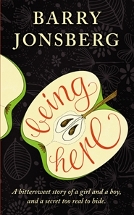Being here by Barry Jonsberg

Allen and Unwin, 2011. ISBN 978 1742373850.
Leah Cartwright lives in a nursing home and suffers from Alzheimer's
disease but is aware that she is in her declining years. When Carly, a
sixteen year old student interviews her for a history project, Leah
recounts her childhood living on a remote farm with only her mother for
company.
Leah's loneliness of childhood is reflected by her existence in the
impersonal care facility. Despite her assurances to Carly that her life
was not unhappy, the reader is left with a real sense of sadness for a
childhood spoiled and lost.
Being a puritanical Christian with an unhealthy, dogmatic, Old
Testament view of life, Leah's mother is arrogant, ignorant and
completely indifferent to the views, needs and rights of others. What
Leah forgives and understands as circumstantial behaviour is nothing
short of child abuse in emotional and physical form, perpetrated by a
domineering bully.
The suffering of Leah's childhood is moderated by the character of
Adam, a boy of her own age who manifests as an imaginary friend yet
develops substance, influence and presence to a degree which must be
determined and rationalised by the reader.
Through Leah, Jonsberg conveys the message that we are in control of
our stories. As a child, Leah was completely and utterly powerless to
alter any tangible aspect of her life and she had no recourse to social
authorities, friends, family or witnesses of any kind. In the midst of
this powerlessness however, the child responds by re-writing her story
in her own imagination, creating an escapist, alternative experience
which merged and also diverged with her reality. It could be considered
that this response is a symptom of mental illness which would be an
understandable outcome produced by the mother's psychiatric problems.
Interviewed by Carly, Leah has the opportunity to tell her story to a
person who at first appears completely disconnected in a cultural and
generational sense, yet who becomes captivated by the tale. Talking
together, the pair offer insights which touch each other and a
meaningful relationship beyond the school project is formed.
The theme of story telling continues with Leah's desire to commit her
life to tape, almost as a statement but with an attempt to positively
influence Carly, thus altering and participating in her life story.
This narrative will be interpreted differently by readers as Jonsberg
invites them to take some responsibility for bringing the character of
Adam to life and making conclusions about his nature and purpose.
Rob Welsh